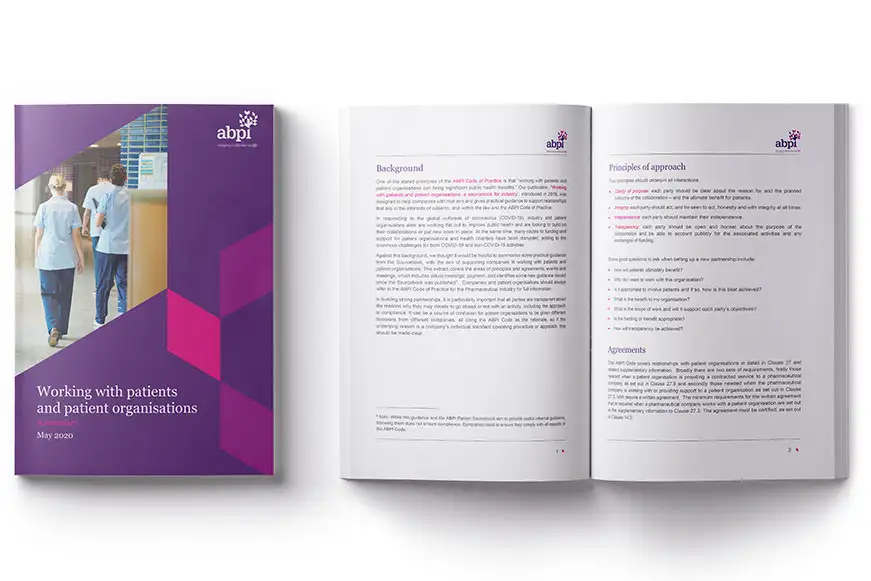Summary - working with patients and patient organisations

In response to COVID-19, we thought it would be helpful to summarise some practical guidance from the Sourcebook, with the aim of supporting companies to work compliantly with patients and patient organisations.

Working with patients and patient organisations - a summary
This extract covers the areas of principles and agreements; events and meetings; payment; and identifies some new guidance issued since the Sourcebook was published [1].
Background
One of the stated principles of the ABPI Code of Practice is that “working with patients and patient organisations can bring significant public health benefits.” Our publication, “Working with patients and patient organisations: a sourcebook for industry”, introduced in 2019, was designed to help companies with that aim and gives practical guidance to support relationships that are in the interests of patients, and within the law and the ABPI Code of Practice.
In responding to the global outbreak of coronavirus (COVID-19), industry and patient organisations alike are working flat out to improve public health and are looking to build on their collaborations or put new ones in place. At the same time, many routes to funding and support for patient organisations and health charities have been disrupted, adding to the enormous challenges for both COVID-19 and non-COVID-19 activities.
Against this background, we thought it would be helpful to summarise some practical guidance from the Sourcebook, with the aim of supporting companies to work compliantly with patients and patient organisations.
In building strong partnerships, it is particularly important that all parties are transparent about the reasons why they may decide to go ahead or not with an activity, including the approach to compliance. It can be a source of confusion for patient organisations to be given different decisions from different companies, all citing the ABPI Code as the rationale, so if the underlying reason is a company’s individual standard operating procedure or approach, this should be made clear.
We would like to thank all contributors to the Sourcebook from industry and patient organisations.
[1] Note: While this guidance and the ABPI Patient Sourcebook aim to provide useful informal guidance, following them does not ensure compliance. Companies need to ensure they comply with all aspects of the ABPI Code.
Principles of approach

Four principles should underpin all interactions:
- Clarity of purpose: each party should be clear about the reason for and the planned outcome of the collaboration – and the ultimate benefit for patients.
- Integrity: each party should act, and be seen to act, honestly and with integrity at all times.
- Independence: each party should maintain their independence.
- Transparency: each party should be open and honest about the purpose of the collaboration and be able to account publicly for the associated activities and any exchanges of funding.
Some good questions to ask when setting up a new partnership include:
- Why do I want to work with this organisation?
- How will patients ultimately benefit?
- How will I involve patients?
- What is the benefit to my organisation?
- Who decides on the scope of work?
- If everything was in the public domain, what would it look like?
- What money or benefits are involved?
- How will transparency be achieved?
Agreements
The written agreement must include:
✔ Name of the activity
✔ Names of the organisations involved (pharmaceutical companies, patient organisations and any third parties which will be brought in to help)
✔ Type of activity (e.g. unrestricted grant, specific meeting or publication etc.)
✔ Objectives
✔ Respective roles of the company and the patient organisation
✔ Time frame
✔ Amount of funding
✔ Description of significant indirect/nonfinancial support (e.g. the donation of public relations agency time or free training courses)
✔ Statement that all parties are fully aware that sponsorship must be clearly acknowledged and apparent from the start
✔ Code or codes of practice which will apply
✔ Signatories to the agreement
✔ Date of the agreement
The ABPI Code covers relationships with patient organisation and the pharmaceutical industry.
The ABPI Code covers relationships with patient organisations in detail in Clause 27 and related supplementary information, including a checklist covering the minimum requirements for the written agreement that is required when a patient organisation works with a pharmaceutical company. The agreement must be certified, as set out in Clause 14.3.
Companies should bear in mind that commercial structures can be complicated for people outside the commercial world to navigate. Representatives of patient organisations may have very limited time or resources to devote to administration, so it is really helpful if the company can provide a consistent, single point of contact and take time to smooth the path.
Events and meetings
Clause 22 of the ABPI Code, which covers meetings for health professionals and other relevant decision makers, also applies to pharmaceutical companies supporting patient organisation meetings. It provides detail on what is considered appropriate.
At some events there may be a mixed audience consisting of both health professionals and lay people. Many pharmaceutical companies – and indeed patient organisations – worry about what can be shared when patients are present – whether in real life, or virtually.
The principle on sharing information with the general public still stands: promotion of prescription-only medicines is not permitted. That means that promotional presentations or other material suitable for health professionals would not be appropriate for patients to see. Clause 26.2 of the ABPI Code, and associated supplementary information, provides detail on information that can be shared with the public.
When planning ahead, think carefully about room layout and access, structure of the agenda, timing of Q&As or closing remarks, and how to signpost clearly in advance which sessions are suitable for which audiences; with webinars or other online events, descriptive language and passwords will help to make this distinction. If it’s an independent congress, provide feedback on the format ahead of time.
Aim for a shared, joint solution that respects the interests of all parties as well as the need for good compliance. This also means considering inclusion requirements, as far as reasonably possible, and providing a named person for patients or members of the public to liaise with before and during the event, especially if they have additional needs.
Transparency
While there is a strong public health rationale for engagement, any relationship between patient organisations and the pharmaceutical industry can be perceived as commercially motivated.
That’s why it is crucial to stick to practices of clarity, integrity, independence, transparency and respect.
Under Clause 27, companies must make publicly available each year a list of the patient organisations to which they provide support (both financial and significant non-financial), with a description of what that support is for, and the monetary value.
Remuneration for services
New guidance has now been published by the EFPIA Patient Think-Tank, setting out principles that may help companies in making decisions on remuneration of patients, patient organisation representatives and carers for work undertaken with the pharmaceutical industry. While the guidance provides useful support, it is not a code of conduct.
2 “Fair market value” is not defined in the ABPI Code; the ABPI cannot recommend rates due to competition law. It will depend on a number of elements, including the kind of activity being undertaken, the amount of time invested, and the experience and skills of the people involved. While companies will take their own approach, patients and patient organisations value consistency and clarity on the reasons behind it.
The principles cover the following points:
• The level of remuneration should be fair 2
• Non-discrimination
• Respect
• Non-promotional scope
• Transparency
• Appropriate payments
• Consistency
• Right to refuse remuneration
Further new guidance
The IFPMA has this year issued a Note for Guidance on best practice for interaction with patients, caregivers, and patient organisations, which may also be helpful.
The new advisory note, which is non-binding, complements the IFPMA Code of Practice, setting out principles of interaction. It also includes some guidance on patient support and assistance programmes.
How to get in touch
Details of how to get in touch with the ABPI and PMCPA.
ABPI:
ABPI Head Office
7th floor, Southside
105 Victoria Street
London
SW1E 6QT
Telephone: +44 (0) 20 7930 3477
Email: getintouch@abpi.org.uk
www.apbi.org.uk
https://twitter.com/ABPI_UK
PMCPA:
7th floor, Southside
105 Victoria Street
London
SW1E 6QT
Telephone: +44 (0) 7747 8880
www.pmcpa.org.uk
https://twitter.com/PMCPAUK
Complaints should be submitted to the Director of the PMCPA at the above address, email complaints@pmcpa.org.uk.